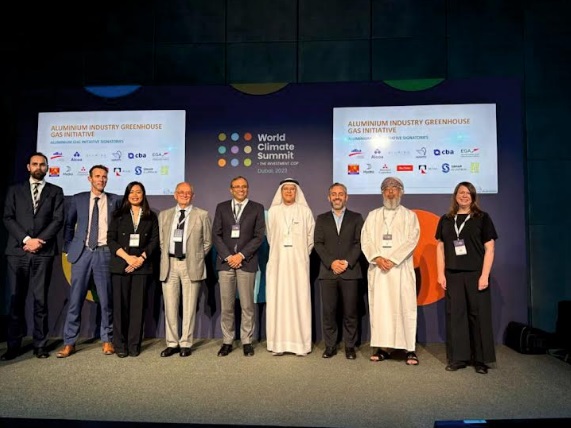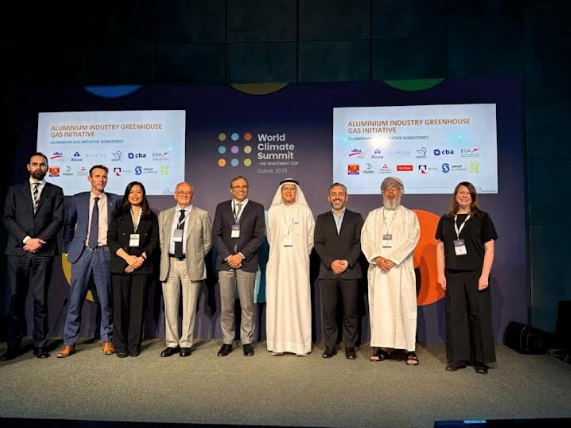The International Aluminium Institute (IAI) has launched a new initiative that commits to transparently and publicly track ambition and progress in greenhouse gas reduction of all its member companies. This initiative, which is being launched at the United Nations’ Climate Change Conference (COP 28) in Dubai, has already been backed by major aluminium producers as the sector continues to act on reducing its greenhouse gas emissions.
 |
Satish Pai, Managing Director of Hindalco Industries and Chair, IAI along with dignitaries during the Ambition to Action session, announcing GHG initiatives launched by IAI at COP 28
Signatories include Aluminerie Alouette, Aluminium Bahrain (Alba), Alcoa Corporation, Alumina Limited, Companhia Brasileira de Alumnio (CBA), Emirates Global Aluminium (EGA), Hindalco Industries Limited, Norsk Hydro, Mitsubishi Corporation, Rio Tinto Aluminium, Rusal, Sohar Aluminium and South32.
Under the new initiative, the IAI is committed to the following:
-
Track and report on our member company’s ambition and progress in greenhouse gas emission reductions
-
Report total global greenhouse gas emissions of the aluminium industry; on a public and annual basis.
Emissions reduction will require investment in new equipment and technology at company and facility level. This initiative facilitates that action through three components:
-
State a long-term greenhouse gas emission reduction target by 31 December 2024 – preferably net-zero and preferably by 2050 – and a plan to achieve the target;
-
Identify an interim greenhouse gas emission reduction milestone – ideally by 2030 – to ensure early progress can be tracked;
-
Disclose progress annually including all facilities utilizing the “IAI Good Practice for Calculation of Primary Aluminium IAI’s Carbon Footprint Methodology” and the “IAI Guidelines on Transparency – Aluminium Scrap” as the calculation references.
This latest initiative aims to foster ambition across the sector and transparently track progress. It complements a range of continual activities and programmes by the IAI to ensure the industry can contribute to achieving global climate targets.
In March 2021 the IAI published a report, Aluminium Sector Greenhouse Gas Pathways to 2050, which set out three technology pathways to emission reductions, in line with the Paris Agreement goals. At COP 26 IAI published an additional decarbonisation scenario for the aluminium sector in line with limiting global warming to 1.5 degrees Celsius.
Earlier this year, it built on that by announcing Aluminium Forward 2030, a coalition of IAIs 25 production members and 20 downstream and customer companies who are joining forces to transform the aluminium sector. The aim is to accelerate progress towards the global net zero target through close collaboration while ensuring that actions also consider all the other UN Sustainable Development Goals.
IAI Secretary General Miles Prosser said, “The aluminium industry is committed to rapidly reducing greenhouse gas emissions and acknowledges that investment and action is required to achieve global goals. The IAI has consistently managed programmes to foster collaboration and action on sustainability and this initiative will drive ambition and action to decarbonise aluminium supply chains.”
Satish Pai, Managing Director of Hindalco Industries and Chair, International Aluminium Institute said, “We gladly welcome the initiative to be transparent on GHGs. Hindalco has been a leader in sustainable metal manufacturing for years. Because of its infinite recyclability, aluminium is ideal for circularity – the carbon footprint of recycled metal is just 5% of primary smelting. We are among the global leaders in circularity with our subsidiary Novelis using recycled metal for 61% of its total aluminium usage, over 2.3 million tons last fiscal year. To reduce emissions, we are advancing innovative clean energy solutions in primary smelting – such as renewable hybrid power with pumped hydro storage. Among the first in the aluminium sector, this project is on course to deliver round-the-clock carbon-free power to our smelters, starting with 100MW. Our emission initiatives are a key aspect of our broader sustainability vision, which also includes audacious targets on reducing water and waste and protecting communities and biodiversity.”
At COP 28, Hindalco won the Energy Transition Change Maker award for their pioneering renewable energy initiative in aluminium decarbonisation. This ground-breaking project marks the worlds first renewable hybrid endeavour supported by pumped hydro storage in the aluminium sector.
Claude Gosselin, President and CEO of Aluminerie Alouette said, ”Innovate for the benefit of our environment than actively contributing to global climate change fight are flagship commitments for Aluminerie Alouette. The International Aluminium Institute (IAI) and its members are leading by example, emphasising the duty of all within the value chain. Ultimately, aluminium is a solution to climate change. We therefore need to focus on our product, which is infinitely recyclable, while working upstream on new technologies and operational changes to further reduce GHG emissions. The expertise of our employees and our mastery of processes enable us to produce aluminium with one of the lowest carbon footprints in the world. We dont intend to stop there.”
Ali Al Baqali, Chief Executive Officer of Aluminium Bahrain (Alba) said, “Climate change is one of the most pressing issues of our time, and as the CEO of Alba, I believe it is our responsibility to take action. We are committed to do our part in addressing this global challenge and driving positive change. we are constantly exploring new ways to minimize our environmental impact and contribute to the fight against climate change while at the same time implement sustainable practices. But our commitment goes beyond internal actions; we are actively engaging with stakeholders and collaborating with industry peers as collective action is central to achieve meaningful progress.“
“The world needs aluminum for the transition to a lower carbon world, and we are ready to meet the expected increase in demand for low-carbon aluminum,” said Alcoa President and Chief Executive Officer, Bill Oplinger. “Alcoa has an ambition to achieve net zero by 2050, and we’re working diligently to get there with mid-term goals while also boosting the percentage of renewable energy to power our smelters,” he said.
Mike Ferraro, CEO of Alumina Limited said, “Alumina Limited continues to focus on transparency and reporting of its emissions profile whilst striving to achieve its net zero by 2050 ambition, and we are pleased to commit to the IAI Greenhouse Gas Initiative. This commitment not only aligns with Alumina Limited’s own targets but demonstrates that the aluminium industry as a whole understands the importance of transparency and taking meaningful actions to decarbonise. Alumina Limited continues to emphasise the key physical attributes of aluminium, including corrosion resistance, ductility, impermeability, recyclability, and low density. We believe these attributes convey that aluminium has an important role to play in facilitating a low carbon transition.“
Luciano Alves, CEO of Companhia Brasileira de Alumnio (CBA) said, “Aluminum plays a very relevant role in current and future global challenges, especially energy transition and combating climate change. At CBA, we already offer low-carbon aluminum, with emissions of 3.03 tons of CO2e per ton of liquid aluminum produced, 4 times below current world average, but we believe we can always do more. For this reason, we are committed to reducing our emissions by 40% from 2019 to 2030, from mining to primary products, and we have been engaging our value chain to act in line with ESG best practices. For us, a more sustainable world is also more collaborative. Therefore, IAI initiatives are essential for us to pursue, together, all pathways towards emissions reduction, an urgent matter for our planet.”
Abdulnasser Bin Kalban, Chief Executive Officer of Emirates Global Aluminium, said, “Aluminium is an essential material for the development of a more sustainable society. It also matters how sustainably aluminium is made, and EGA is committed to reaching net zero by 2050. Accelerating decarbonisation right across the industry is key if aluminium is to reach its full potential to contribute to human progress. That is why EGA strongly supports the International Aluminium Institute in this industry-wide decarbonisation initiative and has signed up to the initiative’s requirements.“
Hilde Merete Aasheim CEO of Norsk Hydro said, “Aluminium is a critical material for the green transition. However, the transition will only be green if the materials are produced with the lowest carbon footprint possible – with a minimal impact on nature and people. Hydro set ambitious targets to reduce greenhouse gas emissions by 30% by 2030 and become carbon neutral by 2050, and we are well on track to deliver. We are supporting the International Aluminium Institute’s initiative for an industry-wide decarbonisation path.”
Hiroshi Nakayama, General Manager of Aluminium Department Mitsubishi Corporation said, “As a member of the International Aluminium Institute (IAI), we are pleased to join IAI’s GHG Initiative, which aims to reduce greenhouse gas emissions from the aluminium sector. Participating in the initiative will enable us to enhance our competitiveness, innovation and resilience in the global market while creating value for our stakeholders and the environment. We are proud to be part of the IAI and its vision of a sustainable aluminium industry.”
Engineer Said Al Masoudi, CEO of Sohar Aluminium stated, “At Sohar Aluminium, we strongly believe that working together with all concerned parties is essential to reduce the overall impact on the environment and ensure a sustainable future for our generations to come. As part of our efforts, we are aligned with the Sultanate of Oman’s commitment to achieve Net Zero by 2050 while interim targets are being set for 2030 and 2040. Signing up to the GHG initiative by IAI is another step in our commitment towards decarbonisation and transparency in our journey towards an organisation that has and will Deliver Aluminium Responsibly.“
Notes to editors
Companies with aluminium investments but who do not have operational control may choose to publicly demonstrate their commitment by following the above actions at a whole-of-business level. IAI member companies who are minority shareholders in aluminium businesses can report progress using other calculation references to allow for consistency in their overall reporting.
About International Aluminium Institute
The International Aluminium Institute (IAI) is the only body representing the global primary aluminium industry. The Institute has the most comprehensive global data on Aluminium with more than 50 years of analysis on production, consumption, energy use and environmental impact.
For more information, visit www.international-aluminium.org, or connect with us on X and LinkedIn.
![]() This content comes to you under an arrangement with NewsVoir. Source
This content comes to you under an arrangement with NewsVoir. Source

